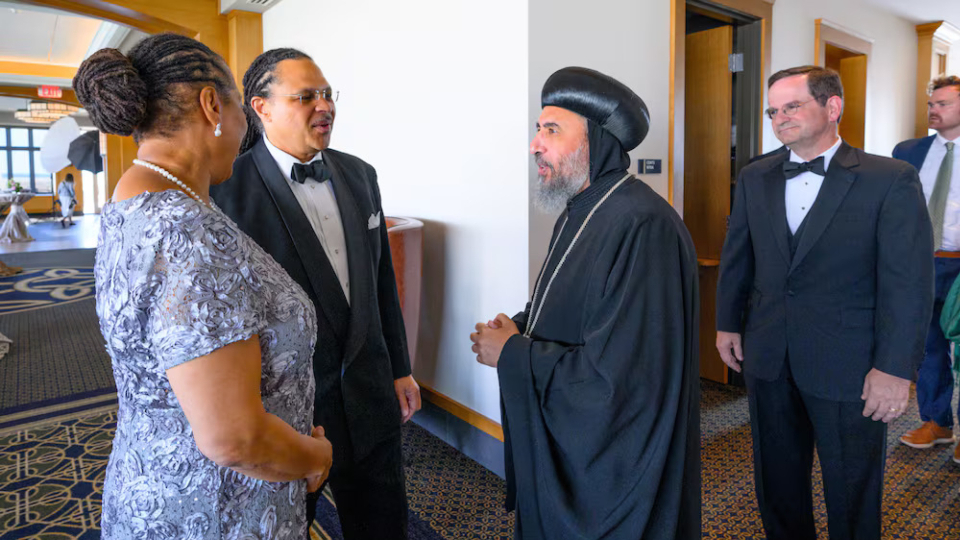
notre-dame-religious-liberty-1.jpg
G. Marcus Cole, dean of the Notre Dame Law School, and his wife, Angie, welcome participants to the 2024 Notre Dame Religious Liberty Summit awards gala in Notre Dame, Indiana, on Wednesday, July 10, 2024. Photo provided by Matt Cashore/University of Notre Dame, courtesy of Church News.All rights reserved.This story appears here courtesy of TheChurchNews.com. It is not for use by other media.
By Sarah Jane Weaver, Church News
More than a decade ago, David Palmer, a Christian and businessman from Indianapolis, learned of an immediate need for his city’s homeless population.
Men, many who had addictions or criminal records, needed jobs. Palmer vowed to help.
He started Purposeful Design, a non-profit furniture building company that works with large office complexes in Indiana.
Among those impressive clients is Notre Dame University, said G. Marcus Cole, dean of Notre Dame Law School.
Speaking July 10 during the 2024 Notre Dame Religious Liberty Summit in Notre Dame, Indiana, Cole referenced Palmer — who lived in upscale Carmel, Indiana.
“If you ask David Palmer what he is doing, he will tell you that he’s not building furniture, he’s building men,” he said.
Since its inception, Purposeful Design has helped more than 300 men who were homeless, find a better way of life.
Some of those individuals were able to use their earnings to buy their first home, settling in a crime-ridden area called “the Swamp,” which was located near the Purposeful Design factory. They made changes in the area, building playgrounds and organizing neighborhood watch groups. The crime rate dropped.
Grocery stories and schools followed.
And so did Palmer.
“David Palmer left his large, luxurious home in Carmel and moved his family into a house in the Swamp,” Cole said.
Why? “He will tell you he felt called of God to use his abilities to be of service to those in need. David Palmer doesn’t just believe in God, he lives his belief,” said Cole. Cole said Palmer is an example of what’s missing from our narrative about freedom of religion. “We need to emphasize the good that religion can bring,” he said.
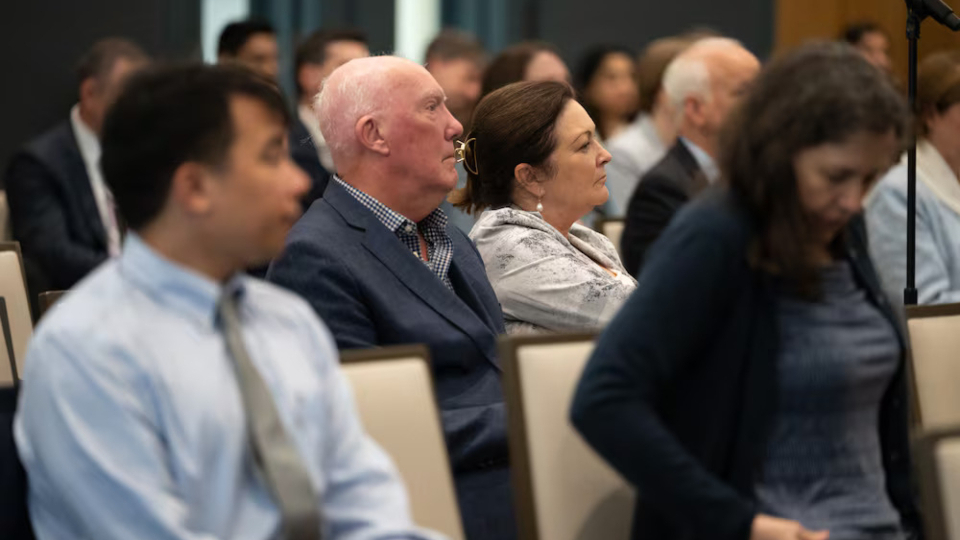
notre-dame-religious-liberty-2.jpg
The audience listens to Elder Alexander Dushku, a General Authority Seventy and general counsel for The Church of Jesus Christ of Latter-day Saints, as he reflects on “Religious Liberty in a Polarized Age” during the 2024 Notre Dame Religious Liberty Summit in Notre Dame, Indiana, on Thursday, July 11, 2024. Photo by Casey Patrick Photography, courtesy of Church News.All rights reserved.Restore ‘Faith in Faith’
Almost 200 leading scholars, advocates and faith leaders from more than 10 countries gathered on the Notre Dame campus to discuss “Depolarizing Religious Liberty” during the 2024 Notre Dame Religious Liberty Summit.
During this time of political and cultural polarization, the best way to make the case for religious liberty is to “restore faith in faith,” Cole told them.
“We must prove to the secular world that the world is a better place with religious freedom or belief” — even for those who do not believe, he said.
While welcoming guests to campus, Cole said the summit comes at an important time.
In 2024, more than half of the world’s populations are engaged in electing new national governments, said Cole. In recent weeks, for example, France, the United Kingdom and India have all just held elections and, later this year, the United States will elect a president.
But the challenge for those who know the importance of religious freedom is to take religious liberty out of politics. “For religious liberty to flourish, it cannot be an issue of the right or the left,” said Cole. “It cannot be the property of conservatives or liberals. It cannot be valued by some and derided by others.”
Religious liberty, he said, should be championed by all people of faith — and by people of no faith.
Still, while offering remarks at the evening gala, Cole said people of faith should be thoughtful when they speak about religious liberty to the rest of society.
Talk about religious freedom can feel like a foreign language to some, he said. “It’s a scary language, a threatening language.”
Over the last few years, defenders of religious freedom have won tremendous, hard-fought victories in a court of law, he said.
But “these legal victories are fleeting, if we don’t also win in the court of public opinion,” Cole said. “We’ve won victories of the mind. We also need to win victories of the heart.”
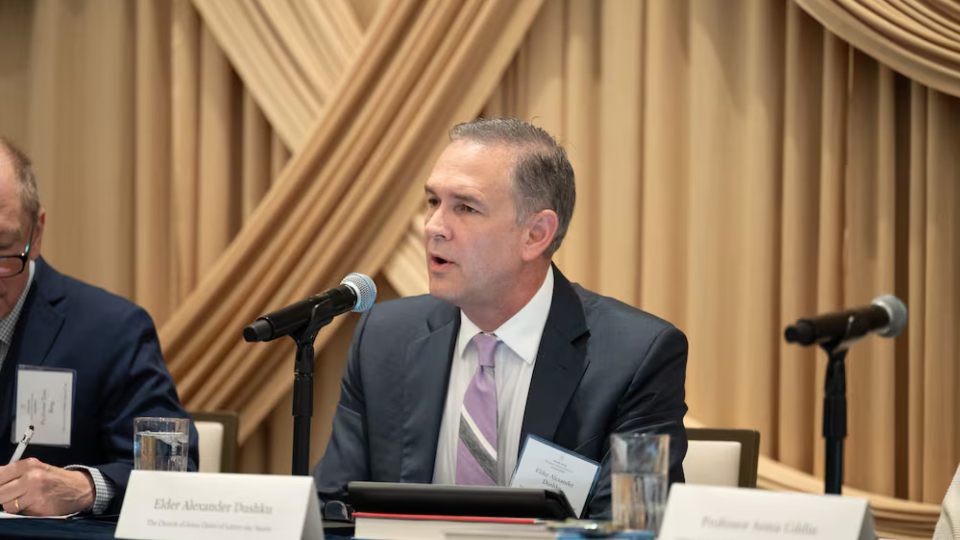
notre-dame-religious-liberty-3.jpg
Elder Alexander Dushku, a General Authority Seventy and general counsel for The Church of Jesus Christ of Latter-day Saints, reflects on “Religious Liberty in a Polarized Age” during the 2024 Notre Dame Religious Liberty Summit in Notre Dame, Indiana, on Thursday, July 11, 2024. Photo by Casey Patrick Photography, courtesy of Church News.All rights reserved.The Flourishing of Religious Faith
Father Robert Dowd, president of University of Notre Dame, said during the summit that at their best, religious faith communities unite people across differences and “call us to something higher and deeper and truer than any ideology can contain.”
They also can inspire people to make sacrifices for others beyond their affinity groups. “That is crucial to the functioning of any decent society, especially a society that calls itself a democracy,” said Father Dowd.
They also can inspire people to make sacrifices for others beyond their affinity groups. “That is crucial to the functioning of any decent society, especially a society that calls itself a democracy,” said Father Dowd.
“The freedom and flourishing of religious faith — the faith that feeds spiritual hunger, and often physical hunger, that builds community and bridges social divides — is the key to a just, peaceful and humane future.”
Elder Alexander Dushku, a General Authority Seventy and general counsel for The Church of Jesus Christ of Latter-day Saints, said “if religious freedom is to be the means of human flourishing … then it must be conducive to a just and livable peace among contending factions so that all may flourish.”
Stephanie Barclay, director of the Notre Dame Religious Liberty Initiative, also spoke about the importance of worship in a polarized society.
She noted that as the number of people who are not attending church increases, “we have another lost opportunity where people can sit on a pew with someone that they disagree with, who sees the world differently.”
John Inazu of Washington University in St. Louis, addressed the topic learning to disagree amid the polarization. “Social change isn’t going to happen without individual change,” he said. It starts with listening, learning, forgiving and understanding.
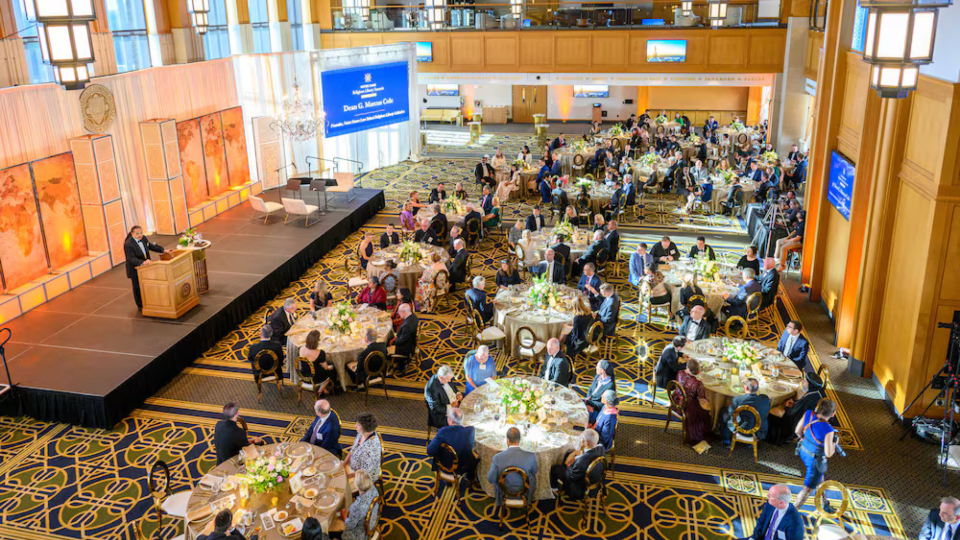
notre-dame-religious-liberty-4.jpg
G. Macus Cole, dean of the Notre Dame Law School, speaks during the 2024 Notre Dame Religious Liberty Summit gala in Notre Dame, Indiana, on Wednesday, July 10, 2024. Photo by Matt Cashore, courtesy of Church News.All rights reserved.Search for Truth
Religious Liberty itself should not be polarizing, said Bishop Kevin C. Rhoades during the summit. “Indeed, Americans seem to be in agreement that religious freedom is important.”
Referencing both the Beckett Fund’s religious freedom index and a recent Pew report, Bishop Rhoades said a majority of Americans “think religion is good for public life. The idea that people should be free to practice their religion seems to be thoroughly ingrained in the American imagination.”
So what’s the problem?
“It seems to be that many of our disagreements have to do with where the limits on religious liberty ought to be,” he said.
Religious liberty is not an unconditional right, and one cannot claim a religious liberty right to commit an injustice or to cause harm to the common welfare, he said.
“Many people who wish to unduly restrict religious liberty seem to understand themselves as simply putting reasonable restrictions on religious practice,” he said.
Bishop Rhoades said the search for truth should be the reference point for all seeking to depolarize religious liberty.
“Religious freedom is not a pretext for the individual to engage in any activity he or she wishes,” he said. “The idea is that when we seek religious truth, and then come to believe we have found it, an obligation imposes itself on us to follow through on this search and conduct ourselves in light of the truth as we understand it.”
Religion, he said, is something that comes from outside an individual. “It’s not something I invent. Rather, first and foremost, religion is about truths that are discovered.”
For example, people of faith build hospitals and schools because it is what they believe God wants them to do.
“Religion is fundamentally a matter of truths that make certain claims on our lives, claims that are more important than the claims of any earthly government. If religion in all its permutations involves truth that is discovered, not made, than religious freedom is a matter of allowing people room to seek and find it.”
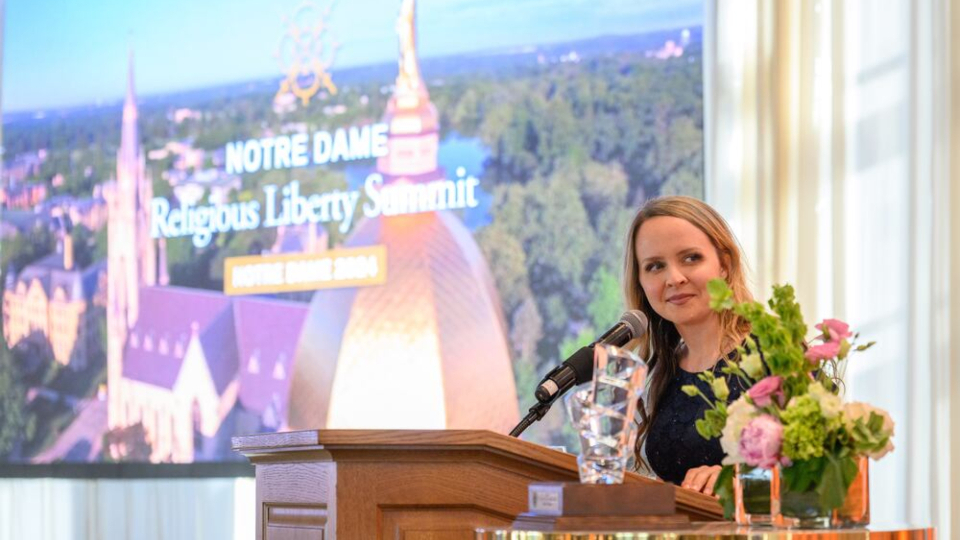
notre-dame-religious-liberty-5.JPG
Professor Stephanie Barclay gives opening remarks at the 2024 Notre Dame Religious Liberty Summit in Notre Dame, Indiana, on Wednesday, July 10, 2024. Photo by Matt Cashore, courtesy of Church News.All rights reserved.What’s Missing in the Narrative?
In efforts to protect religious liberty, law and the religious freedom court victories are important, Cole said. But religious liberty is a battle that must be won through legal challenge and in a court of public opinion. “And that courtroom is in each heart. We cannot win hearts with reason. We must win hearts with love.”
In the United States, Cole said, religious freedom has “produced a lot of love.”
The single largest provider of health care in this country is the Catholic Church. The Catholic Church is also the largest provider of education in the United States. “And those numbers are multiplied by orders of magnitude all around the world, especially in the poorest communities of the world.”
Each year, The Church of Jesus Christ of Latter-day Saints gives away more than $1 billion in 190 countries around the world, and other faith traditions do the same, he said.
“These actions are not compelled by law or paid for with taxes. This work is an expression of faith, rooted in love. Religion is good for the world. But it can only be good for the world if we are free, not only to believe, but to actually live our beliefs. Religious Freedom allows us the freedom to show others that we love them. And so we should.”
Legal victories in court are not enough, said Cole.
“In a politically polarized world, these legal victories will last only as long as people believe that religion is a good thing.”
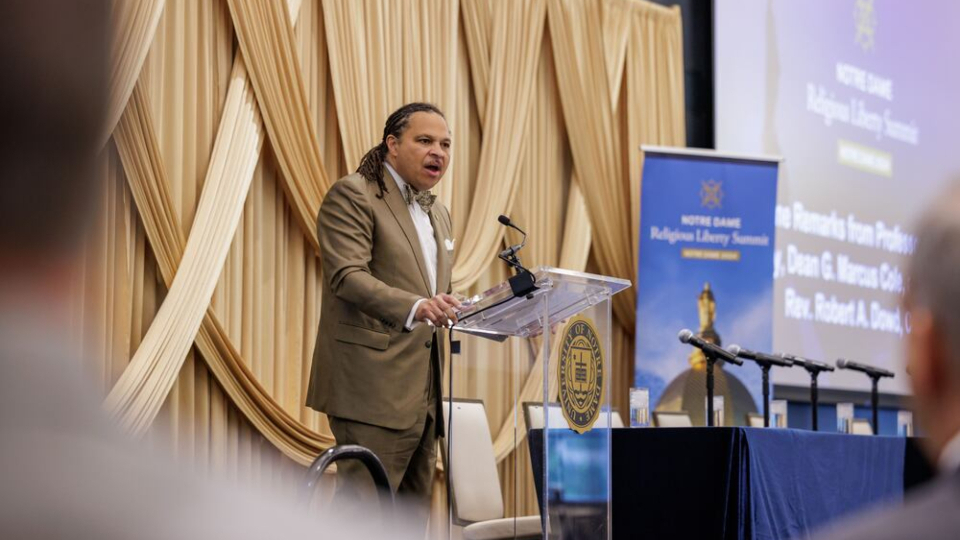
notre-dame-religious-liberty-6.jpg
G. Macus Cole, dean of the Notre Dame Law School, welcomes participants to the 2024 Notre Dame Religious Liberty Summit in Notre Dame, Indiana, on Wednesday, July 10, 2024. Photo by Peter Ringenberg/University of Notre Dame, courtesy of Church News.All rights reserved.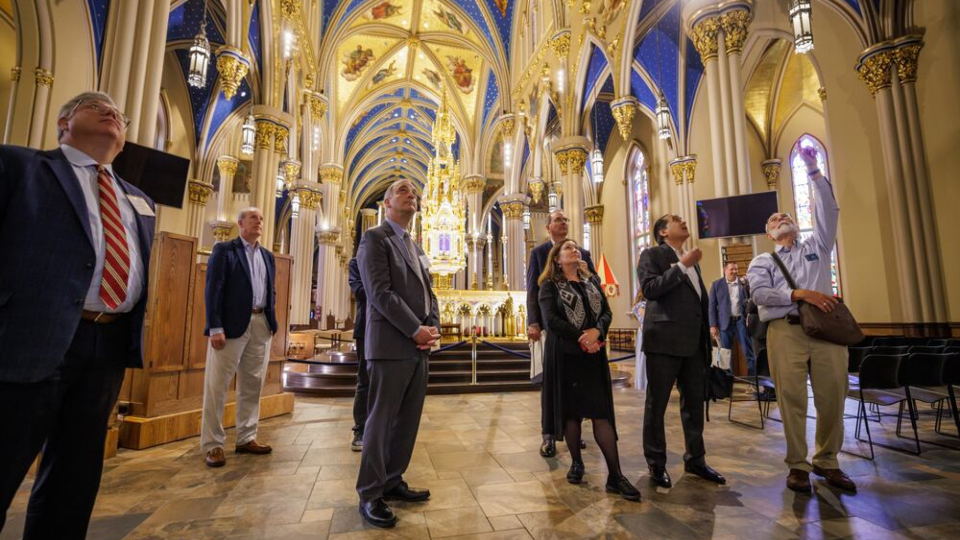
notre-dame-religious-liberty-7.jpg
Participants of the 2024 Notre Dame Religious Liberty Summit tour the Basilica of the Sacred Heart in Notre Dame, Indiana, on Tuesday, July 9, 2024. Photo by Peter Ringenberg, courtesy of Church News.All rights reserved.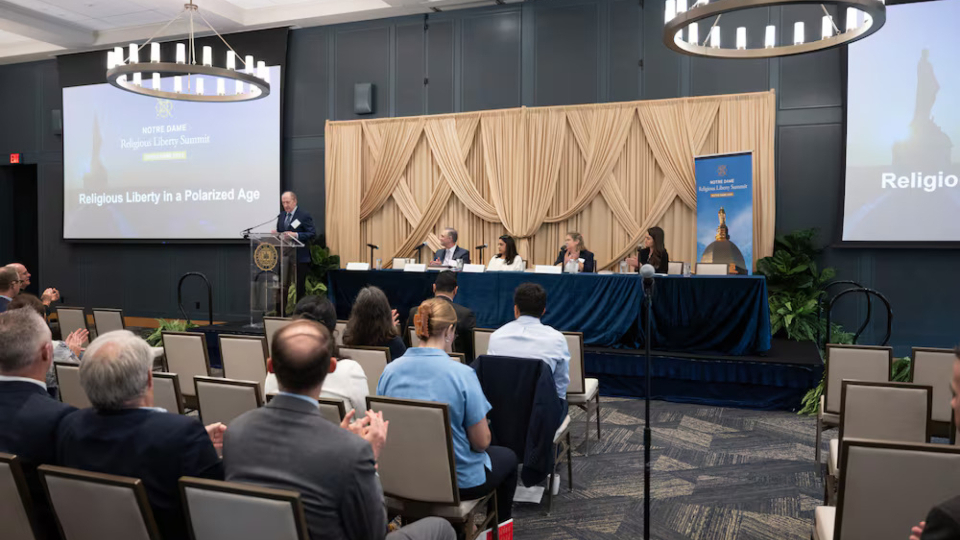
notre-dame-religious-liberty-8.jpg
Elder Alexander Dushku, a General Authority Seventy and general counsel for The Church of Jesus Christ of Latter-day Saints, left at table, participates on a panel about “Religious Liberty in a Polarized Age” during the 2024 Notre Dame Religious Liberty Summit in Notre Dame, Indiana, on Thursday, July 11, 2024. Photo by Casey Patrick Photography, courtesy of Church News.All rights reserved.Copyright 2024 Deseret News Publishing Company.
